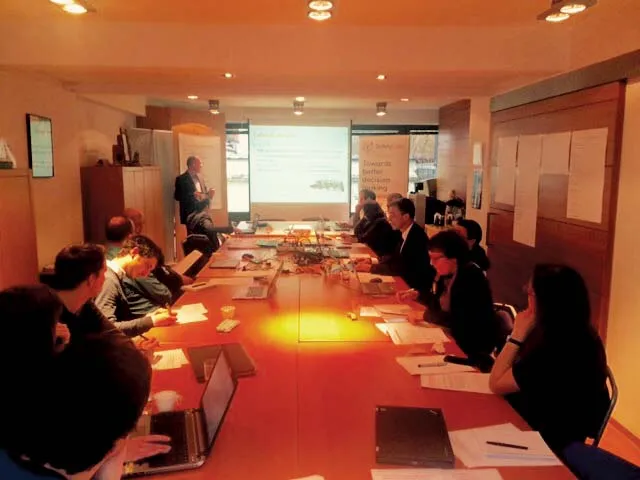The year 2012 is said to have seen the lowest road deaths on record within most OECD (Organisation of Economic Co-operation and Development) and IRTAD (International Traffic Safety Data and Analysis Group) countries. However, the IRTAD Annual Road Safety Report 2013, published yesterday by the International Transport Forum at the OECD, also claims road safety performance in terms of fatalities per 100,000 of population varies considerably among OECD-IRTAD countries. The difference between the best and the w
May 23, 2013
Read time: 3 mins
The year 2012 is said to have seen the lowest road deaths on record within most OECD (Organisation of Economic Co-operation and Development) and 3444 IRTAD (International Traffic Safety Data and Analysis Group) countries.
However, the IRTAD Annual Road Safety Report 2013, published yesterday by the1102 International Transport Forum at the OECD, also claims road safety performance in terms of fatalities per 100,000 of population varies considerably among OECD-IRTAD countries. The difference between the best and the worst road safety performers is said to be three-fold.
The disparity is said by the IRTAD report to reflect the divide between developed countries with effective road safety policies and emerging economies facing rapid motorisation that outpaces the implementation of safety measures.
The bulk of reductions in fatalities is said to have benefitted car occupants. Largely due to increased passive safety features of cars, deaths among car passengers have halved in the past decade.
Results have been less positive for vulnerable road users. Between 2000 and 2010, in OECD-IRTAD countries pedestrian and cyclist deaths fell by only one third, and those of moped and motorcycle riders by only 14%.
The safety of vulnerable road users continues to be a core road safety issue, not least in lower income countries. Also, with many countries seeking to encourage active mobility, improving safety for pedestrians and cyclists is said by the IRTAD report to be a priority.
Another core challenge is the reduction of serious injuries caused by road crashes. Such injuries often result in lifelong disabilities associated with considerable economic as well as emotional costs.
The impact of serious road injuries is often greatly underestimated, partly because of gaps in the data recording injury crashes. Currently, only a limited number of countries are able to provide sound road injury data.
An internationally accepted definition of a serious injury did not exist until recently. A proposal made by an IRTAD expert group has now been adopted by the2465 European Commission, which is expected to issue a reduction target on serious injuries for the year 2020. The challenge for IRTAD members now is to implement the recommendations.
IRTAD is an international expert network and database on road safety data. A permanent working group of the International Transport Forum, IRTAD is composed of road safety experts and statisticians from safety research institutes, national road and transport administrations, international organisations, universities, automobile associations, the automobile industry, and others from OECD and non-OECD countries.
More than 70 organisations from 34 countries are currently IRTAD members, representing a wide range of public and private bodies with an interest in road safety.
The most visible product of the IRTAD Group is the International Road Traffic and Accident Database. The database includes aggregated data on injury accidents, road fatalities, injured and hospitalised road users, as well as relevant exposure data.
The ambition of IRTAD is to include new countries and to build and maintain a high-quality database on road safety information.
However, the IRTAD Annual Road Safety Report 2013, published yesterday by the
The disparity is said by the IRTAD report to reflect the divide between developed countries with effective road safety policies and emerging economies facing rapid motorisation that outpaces the implementation of safety measures.
The bulk of reductions in fatalities is said to have benefitted car occupants. Largely due to increased passive safety features of cars, deaths among car passengers have halved in the past decade.
Results have been less positive for vulnerable road users. Between 2000 and 2010, in OECD-IRTAD countries pedestrian and cyclist deaths fell by only one third, and those of moped and motorcycle riders by only 14%.
The safety of vulnerable road users continues to be a core road safety issue, not least in lower income countries. Also, with many countries seeking to encourage active mobility, improving safety for pedestrians and cyclists is said by the IRTAD report to be a priority.
Another core challenge is the reduction of serious injuries caused by road crashes. Such injuries often result in lifelong disabilities associated with considerable economic as well as emotional costs.
The impact of serious road injuries is often greatly underestimated, partly because of gaps in the data recording injury crashes. Currently, only a limited number of countries are able to provide sound road injury data.
An internationally accepted definition of a serious injury did not exist until recently. A proposal made by an IRTAD expert group has now been adopted by the
IRTAD is an international expert network and database on road safety data. A permanent working group of the International Transport Forum, IRTAD is composed of road safety experts and statisticians from safety research institutes, national road and transport administrations, international organisations, universities, automobile associations, the automobile industry, and others from OECD and non-OECD countries.
More than 70 organisations from 34 countries are currently IRTAD members, representing a wide range of public and private bodies with an interest in road safety.
The most visible product of the IRTAD Group is the International Road Traffic and Accident Database. The database includes aggregated data on injury accidents, road fatalities, injured and hospitalised road users, as well as relevant exposure data.
The ambition of IRTAD is to include new countries and to build and maintain a high-quality database on road safety information.









